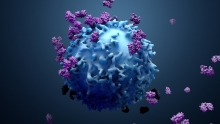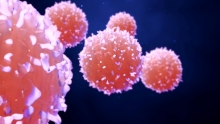Montreal, March 26, 2025 – McGill University’s DNA to RNA Initiative (D2R) has awarded over $10 million in funding to support three groundbreaking research projects that will advance RNA-based therapies for cancer and rare genetic diseases. The awards were initially announced at the D2R Research Symposium on March 13, 2025.

Come visit us and borrow the books below today from room 354 at The Neuro:
-
Être du monde by Maryse Rouy
-
Voir la mer by Ruth Fitzmaurice
-
Epilepsies de l'enfant, de l'adolescent et de l'adulte : de la physiopathologie à la prise en charge by Sophie Dupont
-
Les Épilepsies N. éd. by Nathalie Tordjman
-
Épilepsie et psychiatrie by Pierre Thomas & Arnaud Biraben
-
L'Après-cancer : tout un programme ! by Philippe Gourdin & Gersande Bargine

Phosphatases of regenerating liver (PRLs) are a family of enigmatic proteins involved in cell growth and metabolism present in various species. From humans to fruit flies, they play a unique role in the growth of cancerous tumours and the spread of cancer throughout the body. New research emerging from McGill University is contributing to what is known about PRLs, which could potentially become an important tool in the development of cancer-fighting treatments.

Steps were taken in Canada to reduce the use of Bisphenol A (BPA), a toxic chemical linked to prostate and breast cancer, commonly found in plastics, the lining of food cans, water bottles, and paper receipts. But in many cases, it has been replaced with similar hormone disrupting chemicals, like Bisphenol S (BPS). A new study from McGill University shows that every day Canadians are exposed to BPS in the fresh foods they eat, as chemicals migrate from labels on the packaging materials into the food.

Studying the mutations in kidney cancer after surgery could help to better predict the risk of the disease coming back, according to the latest results of a decade-long international study.
The research, undertaken by a team of 44 researchers at 23 institutions across Europe and Canada, including McGill University, is the largest to link the genetic changes that occur in kidney cancer to patient outcomes.
OncoQuébec is a platform that helps Quebecers find all the information in their research for clinical trials in oncology.
This is a recorded webinar on brain fog presented by Cedars CanSupport. Click here to watch the video.

A new study from McGill University finds higher incidence of lung cancer and brain tumors in people exposed to wildfires. The study, which tracks over two million Canadians over a period of 20 years, is the first to examine how proximity to forest fires may influence cancer risk.

Eight projects funded through the Canada Foundation for Innovation John R. Evans Leaders Fund (JELF) and the Government of Quebec acquire new tools and infrastructure to generate new knowledge, from improving breast cancer treatments to understanding the lives of parasitoid insects.

Seven CIHR funded projects at McGill and the Research Institute of the McGill University Health Centre to investigate impacts of vaccine hesitancy, health-care shortages, work-life imbalance for children, youth, and families in the context of the COVID-19 pandemic.

McGill University researchers identify proteins that drive cancer stem cells. Targeting and supressing a particular protein called galectin1 could provide a more effective treatment for glioblastoma, in combination with radiation therapy.
Due to its resistance to therapy, glioblastoma is the most common and aggressive cancerous brain tumour in adults. It grows fast and spreads quickly. While treatments such as surgery, radiation, and chemotherapy can help ease symptoms for a few months, in most cases tumour cells regrow after treatment and the cancer recurs.
Congratulations to Professor Amin Emad of ECE and his team, who won the Omics Data Against Cancer (ODAC) competition to develop AI models to predict response to drug combinations in poor-outcome cancer patients.
You can see the full article at https://www.mcgill.ca/newsroom/channels/news/mcgill-teams-win-big-new-omics-cancer-competition-325933
Earlier today, a Quebec based consortium of research institutes (Génome Québec, Oncopole and IVADO) announced the winners of their first-ever “Omics Data Against Cancer” competition, and McGill research teams were dominant. In fact, of the five selected teams no less than four of them included professors from McGill.

Congratulations to Dr. Nada Jabado, Professor in the Department of Pediatrics and a researcher at the Research Institute of the McGill University Health Centre (RI-MUHC), who received the University of British Colombia's Dr. Chew Wei Memorial Prize in Cancer Research for her transformational work in treating childhood brain cancers.
New findings out of McGill University in Montreal have revealed a potential way to overcome aggressive brain tumours' resistance to therapy: by deleting a specific gene. Researchers have long been searching for ways to treat Glioblastomas – the most stubborn type of brain tumour – as they’re well known for their resistance to treatment. A few years back, they were able to confirm the key role a gene called the OSMR gene plays in the process of brain cancer growth.

